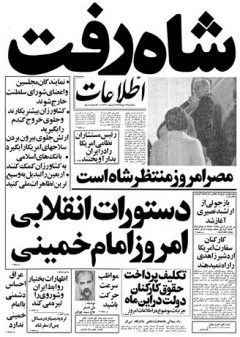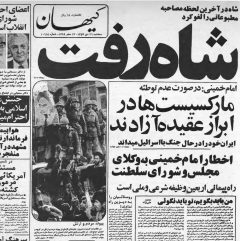UPDATED Feb 3.2023: Thank you for all who attended the launch of the oral history archive, Enghelab Shod: Remembering the 1979 Revolution, on February 2, 2023. We were honoured to have you with us. We invite you to further explore the collected memories at www.enghelabshod.ca
_______________________________________________________________________________
| Captured here is an iconic moment in the 1979 revolution, the Shah leaving Iran. The headlines read: “Shah raft,” translated as “The Shah left” in English. | |
 Ettela’at daily newspaper Jan. 16, 1979. |
 Kayhan daily newspaper Jan. 16, 1979. |
Azar Masoumi, Assistant Professor, Faculty of Arts and Social Sciences, Department of Sociology and Anthropology, Carleton University
Ronak Ghorbani, Doctoral Candidate, Faculty of Environmental & Urban Change, York University
Enghelab Shod [Farsi for “The Revolution Happened”] is an oral history project on memories of the 1979 Iranian revolution. Our goal is to understand this grand historical event from the perspective of everyday folks who lived through it. We explore how people remember “the revolution” and with which places, dates, objects and emotions they associate these memories. Our project prioritizes documenting embodied and affective experiences as narrated through the lens of memory. This approach extends beyond common historiographies’ penchant for meta-narratives of political chronologies, and instead emphasizes the revolution as a complex lived experience that is diversely memorialized by people who live through it.
This project is based on professionally recorded oral history interviews with diasporic Iranians in Canada. In these interviews, we ask participants to describe how they learnt that “the revolution happened”: when, where, and how they began to name and recognize the ongoing political unrest as the culmination of a revolution. We also ask participants to share specific artifacts that are associated with these memories. The diverse age range of our participants provides rich insight in the experience of the revolution at various life stages, including in late childhood and adolescence.
The aim of this project is to create opportunities for intergenerational (and intercultural) communication about life amidst historical change, particularly for younger generations of Iranians for whom the “revolution” has been an abstract background to their lives. To do so, we are creating a publicly accessible online archive to showcase the recorded interviews and collected artifacts in English and Farsi. This project is informed by our own personal interest in understanding the revolution, and what it meant to live through it.